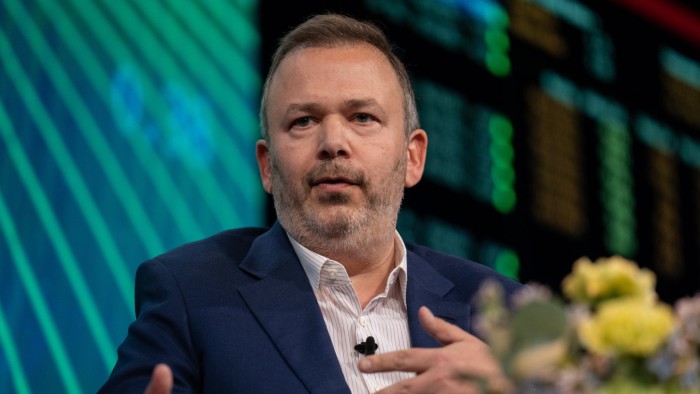Unlock the Editor’s Digest for free
Roula Khalaf, Editor of the FT, selects her favourite stories in this weekly newsletter.
The UK investment trust sector is in trouble. Talk of an existential crisis is not an overstatement.
Rather like ETFs, closed-end investment funds invest in other companies. But unlike ETFs, they have a fixed number of shares, which means that their share prices are more likely to diverge from their net asset values.
That’s what is happening now. Many investment funds’ shares trade at near record discounts to net asset value, thanks to low liquidity, higher interest rates, unflattering cost disclosure rules and outflows from the UK market.
There is a lot of money at stake. A chunky £266bn of assets is managed by 336 trusts. Small wonder that activist investors are digging in. The latest is New York-based hedge fund Saba. It is targeting seven funds that it reckons have together lost 13.4 per cent of their net asset value over the past three years. It aims to oust the boards, install itself as the new investment manager and switch the mandates to buying discounted investment trusts. In an increasingly acrimonious battle, the targets have denounced Saba as opportunistic and self-serving. Founder Boaz Weinstein will try to win over shareholders in a live webinar on Tuesday.
Investors may well be prepared to give Saba a hearing. They have benefited from its build-up of stakes of between 19 per cent and 29 per cent, which has narrowed discounts.
Yet Saba’s case is underwhelming. So far it has said little to persuade investors about the merits of such a radical shift in investment strategy. It talks about replicating the “proven investment process” adopted by its US-based exchange-traded fund, which actively invests in discounted closed-end funds. But its success is debatable.
It boasts that its activism has provided low fees, but provides no numbers about planned charges. Its proposal to replace the boards, and appoint its own representative to six of them doesn’t look good from a corporate governance perspective.
The choice of targets is odd. Take Herald, which invests in small tech companies. It has not performed well over three years, but the same manager has delivered an impressive 2,800 per cent share price total return over three decades. Conversely, there is no denying the poor performance of Keystone, an ESG investor. But it had already drawn up a plan to let investors exit at a 1 per cent discount to asset value or roll over into a sister fund. Saba is not offering a significant improvement on that.
Trusts will do their utmost to rally investors to their cause ahead of the shareholder meetings requisitioned by Saba. But retail shareholders are often apathetic. Many own their shares through platforms, which don’t always make it easy to vote. Without big turnouts, poker-playing Weinstein’s gamble could well pay off.
Read the full article here

